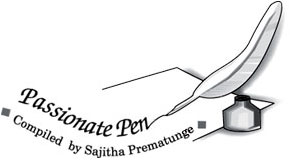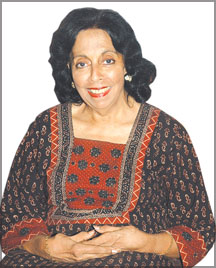'Being an academic you invariably become a critic'
 The author of The Sweet and Simple Kind, previously short listed for
the prestigious Commonwealth Writers Prize, Emeritus Professor of
Macquarie University Yasmine Gooneratne is a critic, a poet and a short
story writer as well as a novelist, specialising in Post Colonial
literature and 18th century English literature. The author of The Sweet and Simple Kind, previously short listed for
the prestigious Commonwealth Writers Prize, Emeritus Professor of
Macquarie University Yasmine Gooneratne is a critic, a poet and a short
story writer as well as a novelist, specialising in Post Colonial
literature and 18th century English literature.
Educated at the University of Ceylon, Peradeniya and at Cambridge
University, she's the author of The Pleasures of Conquest, A Change of
Skies and family memoir Relative Merits. Among her published books are
also studies of Jane Austen, Alexander Pope, Leonard Woolf and Ruth
Prawer Jhabvala.
She has won numerous awards, such as The Order of Australia for
distinguished service to Literature and Education in 1990, the Marjorie
Barnard Literary Award for Fiction for A Change of Skies in 1991 and The
Raja Rao Award for outstanding contribution to the Literature of the
South Asian Diaspora in 2001.
Q: What sort of themes do you write on?
A: My themes depend on things I see, read, hear or experience.
I've written about peace, the act of writing poetry itself and on things
other people say to me. But what ever I write seems to come out as
humour, even if I am angry!
|

Yasmine Gooneratne Pic Chinthaka Kumarasinghe |
In my personal experience I have never started a novel with a theme
in mind. People may write according to various structures but it never
works for me. Novel-writing starts for me with a short story which
develops itself into a novel.
Q: What do you gain from the act of writing?
A: Well, I can tell you it's not money! It's great if your
book attracts a lot of recognition, but there's no guarantee. But in
ways other than money, the gains are enormous. You can create characters
that live by your principles, which is quite satisfying. The other gain
is the feedback. In fiction you cannot provide answers, but you can
explore issues that concern you.
Q: Does personal experience help, or is your writing totally
based on imagination?
A: It's based partly on memory, things that had happened to me
or to others, and partly on imagination. But the basis is definitely
experience. The death of my father compelled me to write my very first
original poem, Review.
My father was, among other things, a lover and collector of books,
and I named the poem Review because in it I treated his personality as
though it was a book - with a cover, and a permanent place in a library.
It was a memorial to my father: I was looking back, reviewing what he
had meant to me.
The poem The Peace Game arose from an article I read in Time
magazine, on a massacre that had taken place during the Vietnam War. The
theme of the poem became the contrast between the affluent and powerful,
and those who are powerless.
I wrote a short story How Barry Changed His Image around twenty years
after I went to Australia. It's about a couple who has emigrated to
Australia, and are astonished by what they find there. My second novel
The Pleasures of Conquest had its beginning in an incident I learned of
when I was in the USA, about a professor who plagiarized the work of a
brilliant student. A novel can begin anywhere, with anything.
Q: You were originally a critic-poet, why?
A: Being an academic you invariably become a critic. The
process of teaching invariably involves one in making judgments, about
good writing and bad, about writing that 'works' and writing that
doesn't.
Q: Later on you switched to fiction, why?
A: It just happened. I found it difficult to write poetry in
Australia.
Q: Why did you experience difficulty writing poetry in
Australia, which you didn't experience in Sri Lanka?
A: When you move from one country to another you are leaving
behind all the visual and aural images that shaped your sensibility. My
poem Sydney Suburbia is based on this scenario. In fact I remember
writing fifteen separate poems on how difficult it was to write poetry
in Australia.
Q: Why did you emigrate and how did the experience of being in
Australia influence your writing?
A: We at first wanted to just have a look around the world. I
had no intension of living anywhere but in Sri Lanka. Our decision to
settle in Australia came several years afterwards. Concern for our
children's education was a motivating factor, also the fact that my
husband and I were both happy in our work.
As to how being in Australia influenced my writing, I felt freer in
Australia. The answer to this question lies in my books. You should
trust the tale and not the teller.
Q: Why didn't you experience difficulty writing fiction in
Australia?
A: Well in fact I did experience difficulty. My first novel
was written twenty years after I went there. But by then I have got to
know the society quite well.
Q: You have written books of criticism on Jane Austen and
Alexander Pope, is there any special reason you selected these
particular people?
A: They selected me! Both writers employ language in a way I
admire. They look at society in a way that is partly critical, partly
amused.
Q: How did the Augustan writers influence you?
A: They demonstrate in their writing the importance of putting
the right word in the right place.
Q: Did Jane Austen influence your writing?
A: Yes, of course. Her characters are always on the verge of
making decisions, like the characters of my latest novel The Sweet and
Simple Kind. She is also a master of irony, irony in the plot as well as
in the narration.
Q: What sort of things influenced you when writing fictions?
A: I'm very interested in observing society. Why people act
the way they do.
Q: What made you write Relative Merits, your family memoir?
A: It was originally a letter meant for my children, they were
very young when they went to Australia and they didn't know much about
my family history. I began writing it on a very special day: Macquarie
University had just given me its first higher doctoral degree, a D.Litt.
and I wanted my children to know that there had been others in my family
before me who had achieved a great deal in the sphere of letters and the
arts.
I found that the manuscript kept getting longer and longer.
Frustrated and dissatisfied, I put it away. When my husband suggested
that I take it up again, I sent parts of the manuscript to five
relatives, who wrote back with their own accounts. Wonderful material!
With that kind of backing, the book practically wrote itself.
Q: The name 'Tsunami', one of the main characters of The Sweet
and Simple Kind, was it a coincidence, or did you write it after the
tsunami?
A: I wrote it after the Tsunami. As every other novel it was
originally a short story, which I published with six other stories about
the same character, in a book titled Masterpiece & Other Stories in
2002. For me 'Tsunami' it was just a Japanese name which I happened to
like.
But when something as tragic as the tsunami happened I could not
associate that name with humorous or light-hearted incidents, so I put
the novel away. Eventually, I introduced 'Latha', Tsunami's cousin, who
has, I think, come to be the most significant character in the book.
Q: The Sweet and Simple Kind has been short listed for the
Commonwealth Writers Prize. How do you feel about that?
A: Three of my books have been short listed before. But I
never saw myself as a professional writer of fiction. I have always seen
myself as a teacher of literature, not as a writer.
This was partly because I taught such great writers Shakespeare,
Donne, Dryden and Pope for example; when you teach such writers on a
daily basis, you never dream of becoming a writer yourself. So this, as
many others came as a surprise. A very pleasant one.
[email protected]
|
